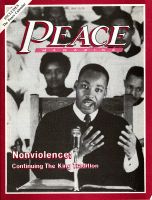
Peace Magazine April 1985, page 23. Some rights reserved.
Search for other articles by Andrew Van Velzen here
TORONTO--In January of this year William Arkin of the Institute for Policy Studies (IPS) in Washington DC, revealed US plans to deploy nuclear depth charges in Canada, Iceland, Bermuda and Puerto Rico. Prior to his disclosure, the governments of the affected nations did not know of the plans.
Following Arkin's disclosure, the plans were widely reported and debated in the four countries concerned. However, it took almost a month for the plans to be revealed in a major American newspaper.
On February 13, the New York Times published an article by the paper's reporter on national security affairs, Leslie H. Gelb. The article outlined the deployment plans and the public debate which had taken place in the host countries.
US Secretary of State George Shultz and National Security Advisor Robert C. McFarlane had asked the Times not to print the story. The editors declined, noting that the plans had already been published in the countries in question, and that it was only the American public which was not being in formed.
After the story appeared, Gelb was accused of publishing classified information harmful to national security by Lieut.-General John T. Chain, Jr., director of the State Department's Bureau of Politico-Military Affairs. Chain was so outraged that he forbade his staff to talk to Gelb, despite the fact that Gelb had worked on the story with an official of the State Department so as to avoid infringing on national security.
Mr. Gelb, who actually held the Politico-Military Affairs post before Chain, has since had his restriction lifted. Clearly, the State Department's reluctance to see the article published was based on concerns about public dissent rather than on the stated concern for national security interests.
As does the strong US re action to New Zealand's ban on nuclear-capable warships, the Gelb affair raises serious questions about the extremes to which officials of the Reagan Administration will go to suppress knowledge or actions that are not seen as beneficial to that Administration's policies.
The actions by the US government should be of encouragement to peace workers around the world, because their vulnerability to dissent is demonstrated by the lengths to which they will go to prevent it.

Peace Magazine April 1985, page 23. Some rights reserved.
Search for other articles by Andrew Van Velzen here